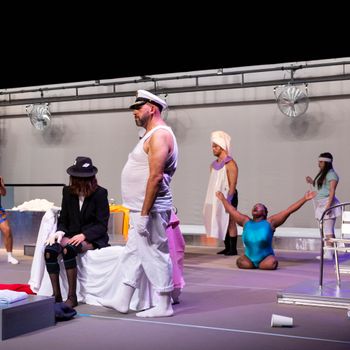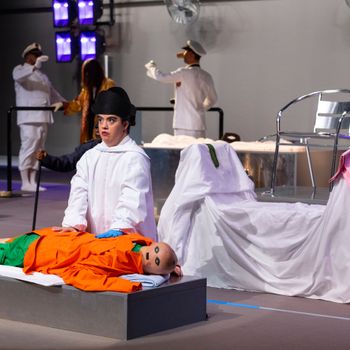Ôss, it’s how you express bone in creole. Phonetically similar to Oss, a common polysemic expression among karate practitioners that in its origin condenses ideas such as pressing, pushing, supporting, tolerating. But this phonetic relationship will only be, and in part, a coincidence, with the bone as guardian and revealer of ancient secrets, guardian of anatomical orientations, structuring box of soft and fragile parts that are in fact what interests us.
Paradoxically, building a strong skeleton, where a foot serves as a brain, the heart serves as an elbow and knees are a liver and an ear, will naturally be possible for us since, between hard and soft, in the end it doesn’t matter.
The parts of this composite and their subsequent destination will be defined by auction.
A little over 40 years ago, the phenomenal May B by Maguy Marin presented, for the first time, different bodies, far removed from the canons of academic dance. These bodies were in reality costumes, prostheses of infirmities. The show was cheered. Ôss goes further and also goes down in history. (Jonathan Chanson “Ôss de Marlene Monteiro Freitas à Chaillot : Marlene, différemment”)
Such a beautiful moving look at difference. Dance At Chaillot, choreographer Marlene Monteiro Freitas creates Ôss, which is a proud attempt at symbolic repair of the handicap. (Muriel Steinmetz “Un si beau regard en mouvement sur la différence”)
There are the shows that we love, and there are those that we will never Forget. Without prejudging my memory - alas too often only emotional - I think that I will not forget Ôss by Marlene Monteiro Freitas with the company Dançando com a Diferença. (@Kikia75 – Post on Instagram about her experience at Théâtre National de Chaillot)
Ôss shows us other bodies that live other lives in other languages. Ôss makes us feel what it is like to live differently: The real experience of otherness. (@Lyne.pennet – Post on Instagram about her experience at Théâtre National de Chaillot)
Marlene Monteiro Freitas (Cape Verde) studied dance at P.A.R.T.S. in Brussels, in Lisbon at the Escola Superior de Dança and at the Fundação Calouste Gulbenkian. In her native country, Cape Verde, she co-founded the dance group Compass and collaborates with musician Vasco Martins. She worked with Emmanuelle Huynh, Loïc Touzé, Tânia Carvalho, Boris Charmatz, among others. Her creations include: Bacchae - Prelude to a Purge (2017), Jaguar (2015), with Andreas Merk, of ivory and flesh - statues also suffer (2014), Paradise - private collection (2012-13), (M)imosa, co-created with Trajal Harrell, François Chaignaud and Cecilia Bengolea (2011), Guintche (2010), A Seriedade do Animal (2009-10), Uns e Outros(2008), A Improbabilidade da Certeza (2006), Larvar (2006), Primeira Impressão (2005). The common denominator of these works is openness, impurity and intensity. In 2017 Portuguese Society of Authors (SPA), awarded Jaguar, the prize for the best choreography and in the same year she was distinguished by the government of Cape Verde for her cultural achievement. In 2018 created the piece Canine Jaunâtre 3 for Batsheva Dance Company. Still in 2018 La Biennale di Venezia has awarded MMF with the Silver Lion for Dance. She has an ongoing collaboration with O Espaço do Tempo (PT). She is the co-founder of P.OR.K, her production structure in Lisbon (PT).
Dançando com a Diferença (Madeira/Portugal) is a dance company founded in 2001 by its Artistic Director, Henrique Amoedo, which since 2014 has maintained a close relationship with Teatro Viriato as a Resident Project. It is in this work on several fronts that this structure has launched, at national and international level, the seeds of a relevant artistic, pedagogical and awareness-raising work for social inclusion, which in turn has been successfully received, both by the public and by enthusiasts of inclusive dance, schools and institutions. It is in the conscience and collective genesis of this Association, the need for a broad and comprehensive work capable of developing the creative and productive potential that directs society towards professional appreciation of inclusive groups, stimulating teamwork, guiding the evolution of societies towards non-discrimination against people with disabilities, encouraging their inclusion in the most varied social sectors.

